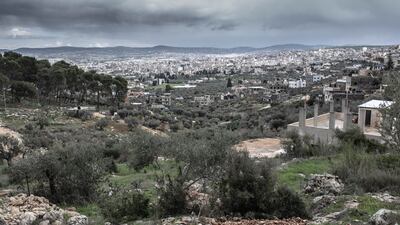Live updates: Follow the latest on Israel-Gaza
“Look at this and tell me what's the difference between here and Gaza,” said Ahmad Istaiti, angrily pointing at a muddy carpet trodden into the rain-soaked floor of his home on the hills surrounding Jenin’s refugee camp in the north of the occupied West Bank.
For much of the Israel-Gaza war, most West Bank Palestinians would not have dared make such a comparison, no matter how bad their lives were becoming. Despite a huge increase in Israeli military raids, settler violence and a disastrous economic crisis since October 7, nothing could compare to the horrors of Gaza.
Now, as a fragile ceasefire holds in the strip between Hamas and Israel, Palestinians in the West Bank are sounding the alarm, terrified that the hardships Israel inflicted on their Gaza compatriots – air strikes, sieges, destruction and endless displacement – await them.
During a trip by The National to Jenin, one of the cities being hit in a major Israeli military operation in the West Bank dubbed Iron Wall, residents and officials were trying to come to terms with how, immediately after the ceasefire in Gaza was announced, their lives became blighted with new lows of violence and displacement.
UNRWA, the UN agency for Palestinian refugees, said on February 10 that the Israeli operation has forcibly displaced 40,000 refugees in the West Bank. “Jenin camp now stands empty, with other camps at risk of the same fate,” it said.
Mr Istaiti, 58, told The National that he fled to the hills “to escape the craziness of the camp and protect my sons”. He spoke as a few shots rang out in the distance, most likely fired from Israeli guns.
“One of my boys was hit by shrapnel in a previous Israeli raid,” he said, pointing to two young men gathered around a bonfire, one with a dent in his left cheek who stared at the flames.
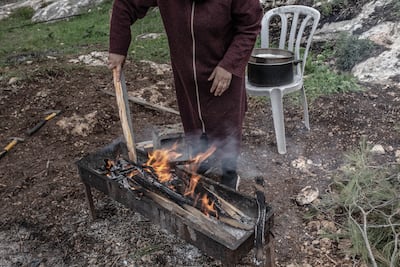
“It went through his eye and into his brain. He was in hospital for four months. He came back to life. The shrapnel killed him but God willed him back. He will be affected for life and some of the shrapnel remains in his head. It will be too dangerous to remove it.”
Like most of the estimated 16,000 people who fled the refugee camp, Mr Istaiti does not know if his house is still standing and he fears the worst.
Days before, he had watched from the hills as about 20 homes in the camp crumbled after an Israeli demolition. The area hit was right next to where his home sits. In a video he recorded of the moments just after, he can be heard screaming “God is great” as smoke climbed through the camp's tightly packed streets and into the air.
Mr Istaiti is determined to go home despite Israel’s defence minister having vowed his forces will stay in the area. “I’m not leaving the camp. I’m here, on my father’s land, as a temporary solution to protect my sons,” he insisted, mirroring the determination of all the camp residents The National spoke to.
Throughout the decades of the Israeli-Palestinian conflict, Jenin, and in particular its refugee camp, has been on the front line of Palestinian resistance.
“They want us to give up. On the contrary, it will be a wake-up call for us. Maybe we’re in shock now, but in the coming weeks and months maybe we’ll wake up,” Mr Istaiti said.
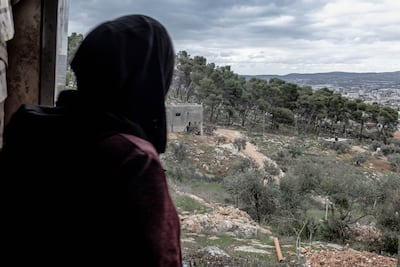
“Our upcoming generation will be even fiercer than the current one in Gaza and the West Bank. We have a generation no one will be able to control.”
As Mr Istaiti’s family milled about him, some searching through a few coats his sister had retrieved from a family home on the outskirts of the camp, NGO worker Nidal Naghnaghiyeh walked around the plot, talking to other displaced people.
His group, Our Palestinian Call for Life, was gathering resources for the displaced and trying to work out who was most in need. Given their living conditions exposed to the elements on the hills, the organisation determined the Istaiti family to be among the worst off, although Mr Naghnaghiyeh said at least 400 families were in “emergency need”.
“Our main concern is to provide each family with a place to stay. A house with a ceiling that can give life with dignity and a kitchen to make their own food – a place of their own,” he said.
Mr Naghnaghiyeh is in close contact with Jenin Mayor Mohammed Jarrar, a lively man who manages to go about his bleak duties with plenty of laughs, although he is in no doubt as to the scale of the task ahead.
“I came in just in time!” he said as he sat down with The National in his office, chain smoking as senior members of the city administration hurried around. Mr Jarrar was elected three months ago, barely giving him any time to settle in before Israel began its raids.
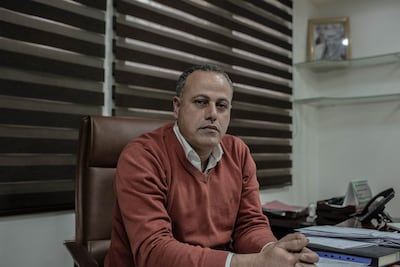
“We noticed since day one of the operation that it was different to previous ones,” he said of the Israeli operation. “First, it started immediately after the Gaza ceasefire announcement and the crisis that it caused in [Israeli Prime Minister] Benjamin Netanyahu’s coalition.”
Israel’s far-right government contains many opponents of the Gaza truce who think the war has been halted too soon and that swapping Palestinian detainees for Israeli hostages is a dangerous humiliation and national security risk.
Iron Wall is widely viewed as a way for Mr Netanyahu to placate such ministers, many of them West Bank settlers who want Israel to take full control of the region.
Mr Jarrar said Jenin has suffered 104 major raids since 2021, which he defined as being more than two days long. Even after such grim experiences, he said there are greater fears about Iron Wall.
“We see their forces working in two ways. First is how they’re changing the structure of the camp – we believe to divide it into six main blocks and create new wider roads that will make it easy for operations in future and to control and isolate different parts of the camp,” he said.
“The second is just random destruction. They are burning houses, planting bombs and destroying infrastructure,” he added.
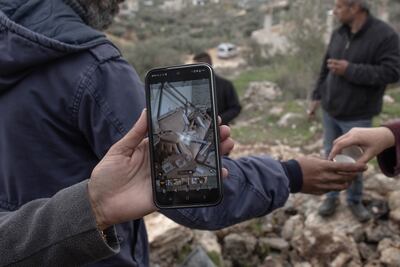
“We would not be surprised if in a few days or weeks the Israelis will tell people they can go back, only for those displaced people to see very soon that without homes and infrastructure there is no way to continue. They will leave again of their own volition so that Israel can claim it didn’t force them. Exactly the same scenario they are trying in Gaza.”
All the residents The National spoke to referred to US President Donald Trump’s comments that he wants Gazans out of the strip as part of its reconstruction, a plan they are terrified will also be applied to the West Bank.
“We know this operation is purely political. It started in Jenin but it won't remain in Jenin, and we as Palestinians know what the Israelis have in mind. The world might be surprised by Trump’s statement but we are not,” Mr Jarrar said.
“We in Gaza and the West Bank are in a very critical and dangerous period. Only Palestinian steadfastness can help us.”
